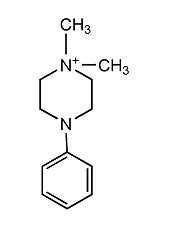1,1-Dimethyl-4-phenylpiperazinium Iodide 1,1-Dimethyl-4-phenylpiperazinium Iodide


Structural formula
| Business number | 016K |
|---|---|
| Molecular formula | C12H19IN2 |
| Molecular weight | 318.20 |
| label |
1-Methyl-4-phenylpiperazinium 1-Methiodide |
Numbering system
CAS number:54-77-3
MDL number:MFCD00011976
EINECS number:200-213-0
RTECS number:TM3385000
BRN number:3746109
PubChem number:24277832
Physical property data
1. Character:Crystal.
2. Density (g/mL,25/4℃): Undetermined
3 . Relative vapor density (g/mL,air=1): Undetermined
4. Melting point (ºC): 234~238
5. Boiling point (ºC,Normal pressure): Undetermined
6. Boiling point (ºC,5.2kPa): Undetermined
7. Refractive index: undetermined
8. Flashpoint (ºC): Undetermined
9. Specific optical rotation (º): Undetermined
10. Autoignition point or ignition temperature (ºC): Undetermined
11. Vapor pressure (kPa,25ºC): Undetermined
12. Saturated vapor pressure (kPa,60ºC): Undetermined
13. Heat of combustion (KJ/mol): Undetermined
14. Critical temperature (ºC): Undetermined
15. Critical pressure (KPa): Undetermined
16. Oil and water (octanol/Log value of partition coefficient (water): undetermined
17. Explosion limit (%,V/V): Undetermined
18. Lower explosion limit (%,V/V): Undetermined
19. Solubility: Undetermined.
Toxicological data
1, acute toxicity: mouse abdominal cavity LD50: 18500ug/kg; mouse subcutaneous LD50: 1030 mg/kg; mouse intravenously LD50: 1600ug/kg; mouse intramuscular LD50: 28mg/kg;
Rabbit vein: 1 mg/kg
Ecological data
None
Molecular structure data
None
Compute chemical data
1. Reference value for hydrophobic parameter calculation (XlogP): None
2. Number of hydrogen bond donors: 0
3. Number of hydrogen bond acceptors: 2
4. Number of rotatable chemical bonds: 1
5. Number of tautomers: none
6. Topological molecule polar surface area 3.2
7. Number of heavy atoms: 15
8. Surface charge: 0
9. Complexity: 173
10. Number of isotope atoms: 0
11. Determine the number of atomic stereocenters: 0
12. Uncertain number of atomic stereocenters: 0
13. Determine the number of chemical bond stereocenters: 0
14. Number of uncertain chemical bond stereocenters: 0
15. Number of covalent bond units: 2
Properties and stability
None
Storage method
This product should be sealed and stored in a cool place.
Synthesis method
None
Purpose
For biochemical research. Ganglionic stimulants.
n-top-alt: auto; mso-margin-bottom-alt: auto” align=left>17. Explosion limit (%, V/V): Undetermined
18. Lower explosion limit (%,V/V): Undetermined
19. Solubility: Undetermined.
Toxicological data
1, acute toxicity: mouse abdominal cavity LD50: 18500ug/kg; mouse subcutaneous LD50: 1030 mg/kg; mouse intravenously LD50: 1600ug/kg; mouse intramuscular LD50: 28mg/kg;
Rabbit vein: 1 mg/kg
Ecological data
None
Molecular structure data
None
Compute chemical data
1. Reference value for hydrophobic parameter calculation (XlogP): None
2. Number of hydrogen bond donors: 0
3. Number of hydrogen bond acceptors: 2
4. Number of rotatable chemical bonds: 1
5. Number of tautomers: none
6. Topological molecule polar surface area 3.2
7. Number of heavy atoms: 15
8. Surface charge: 0
9. Complexity: 173
10. Number of isotope atoms: 0
11. Determine the number of atomic stereocenters: 0
12. Uncertain number of atomic stereocenters: 0
13. Determine the number of chemical bond stereocenters: 0
14. Number of uncertain chemical bond stereocenters: 0
15. Number of covalent bond units: 2
Properties and stability
None
Storage method
This product should be sealed and stored in a cool place.
Synthesis method
None
Purpose
For biochemical research. Ganglionic stimulants.
ge: AR-SA”>This product should be kept sealed in a cool place.
Synthesis method
None
Purpose
For biochemical research. Ganglionic stimulants.